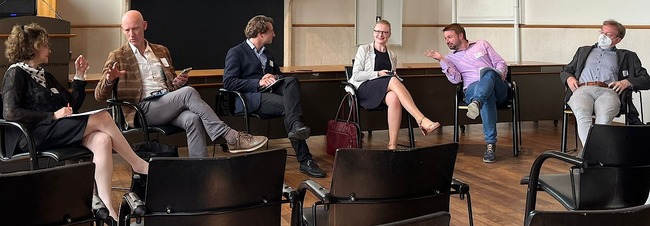Roundtable "Beyond the Law: Justifications of Mass Violence in Social and Scholarly Discourses"
featuring:
Nancy Adler (NIOD/University of Amsterdam),
Christian Gerlach (University of Bern),
A. Dirk Moses (University of North Carolina at Chapel Hill)
co-chaired by Juliane Prade-Weiss, Vladimir Petrovic & Dominik Markl
10 June 2022, 16:00-17:30, Amsterdam
at the NIOD Institute for War, Holocaust and Genocide Studies Amsterdam, 9-11 June 2022

Nanci Adler, A. Dirk Moses, Dominik Markl, Juliane Prade-Weiss, Vladimir Petrovic, Christian Gerlach
While the establishment of accountability for acts of mass violence is dominated by legal discourse, their justifications by perpetrators, accomplices, and descendants — be it assertions of rightfulness, excuses, neutralizations such as denial, or rationalizations — transcend the legal sphere in three significant respects:
- First, legal gestures are informed by tropes and narratives that had previously circulated in political propaganda and quotidian social discourse, and often include appeals to authority taken from the cultural canon.
- Second, justificatory discourses in the courtroom cannot be fully captured by a legal evaluation. Defense strategies frequently evoke ethical, religious, or political arguments without legal merit intended to the court of public opinion.
- Third, and consequently, any attempt at analyzing acts of mass violence for the sake of sanctioning, prevention, or memorialization cannot but face the meaning given to them by perpetrators in justificatory discourses. A challenge of such an analysis is that certain tropes and narratives are to be found in justifications of perpetration, testimonies of victims, and critical discourse alike. A classical instance is of such a transmission is Klemperer’s observation of the unsettling continuity of the National Socialist notion of “cleansing” in the concept “denazification” (Entnazifizierung). A more recent example is the concept of “ethnic cleansing” (etničko čišćenje), which was deployed during the 1990s Bosnian War to condemn mass violence, but circulates globally as a descriptor for atrocities which supposedly do not reach genocidal level. As recent criticism has shown, an even more far-reaching instance of a problematic transmission concerns the very term genocide. It perpetuates the question of whether a victimized group is a gens, casting ethnicity as ontological status rather than as a result of identificatory discourses which are often at the very core of ideologies that incite mass violence.
These instances of the perpetuation of justificatory discourse are, on the one hand, unsurprising given the temporal transmission and spacial dissemination of the aftermath of mass violence that has been a recent focus in genocide studies, i.e., the transgenerational transmission of trauma in victimized groups and the socio-psychological sequelae of mass violence in perpetrators, accomplices, and descendants as well as the fact that memories travel around the globe. Still, the perpetuation of justificatory discourse is ethically problematic as it transmits the point of view of perpetration, and it is dangerous as it prepares the ground for legitimizing further conflict by cementing (ethnic, religious, or other) fault lines.
The interdisciplinary roundtable addresses the problem that while justifications may be perceived as mere pretexts to manifest material or strategic interests, they, nevertheless, establish the terminology, narratives, and heuristics in which acts of mass violence are subsequently discussed by inscribing them into juridical logic, historiographical terminology, and cultural traditions. The roundtable, therefore, follows the rationale that replacing terminology is insufficient as it warrants no understanding of the structures and dynamics causing and contributing to the transmission of justifications of mass violence. The roundtable discussion aims at outlining such linguistic and heuristic continuities as well as at discussing how they can be addressed, and counteracted, in scholarly discourse, restorative justice, and cultural memorialization.

